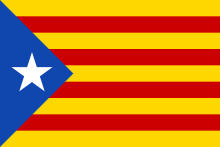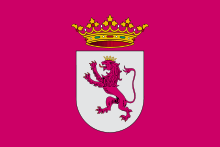- Nationalisms and regionalisms of Spain
-
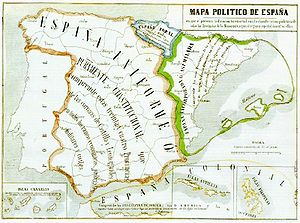 Early 19th century map showing the different regions of traditional consuetudinary law in Spain (fueros) based on the historical kingdoms.
Early 19th century map showing the different regions of traditional consuetudinary law in Spain (fueros) based on the historical kingdoms.
Historically, the modern country of Spain was formed after the process known as Reconquista.
Several independent Christian Kingdoms and political entities mostly independent (Asturias, León, Galicia, Castile, Navarre, Aragon, Catalonia) were formed by their own inhabitants efforts under aristocrat leadership and coexisted with the Muslim Iberian states and had their own identities and borders.
Eventually, the kingdoms of Castile and Aragon grew in power and size through conquest or by dynastic inheritance and their Crowns holders merged in 1469 with the marriage of the Catholic Monarchs. After this, the Muslim kingdom of Granada was conquered in 1492 and Navarre was invaded and forced into the union in 1512 through a combined effort of conquest and collaboration of the local elites.
Portugal, formerly part of León, gained independence in 1128 after a split in the Royal inheritance of the daughters of Alfonso VI and remained independent through all of the reconquista process.
For a short time starting with Philip II of the House of Habsburg, Portugal was reunited along all the other realms under the same Head of State, in the Iberian Union. However the Portuguese will revolt as the Dutch provinces and other Habsburg dominions and became officially independent again from their Sovereigns in 1640.
These kingdoms sometimes collaborated when they fought against the Muslim Spain and sometimes allied with the Muslims against rival Christian neighbors. This common enemy of a different Faith has been usually considered the single crucial catalyst in the union of the different Christian realms. However, it was effective only for conquered territories and resettlement that never returned or restituted terrain to become permanently Christian again. Very few times Christians returned territory or populations conquered from the Muslim people. The Unions that came later were and are a whole different subject, as some of them happened long after the departure of the last Muslim Monarchs.[1]
All these different kingdoms were ruled together and separetly by personal union of their title holders, but maintained their particular ethnic differences regardless of similarities from common origins or through borrowed customs.
Since the reign of Phillip V, there has been a process of uniformization by the central authorities. [2]
Simultaneously, this uniformization has been repelled by some of the local elites that had their own national conscience based on traditional, historical, linguistical and cultural traits.
Some Kingdoms, like Navarre and the Lordships of the Basque Country, maintained certain constitutions based on their historical rights, and laws while other Kingdoms revolted to this process of centralism demanding also a return of their derogated laws and better conditions (Revolt of the Comuneros, Revolt of the Brotherhoods, Catalan Revolt). The nationalisms as a movement with significant support appears by the end of the 19th century, coinciding with the loss of the last parts of the Spanish Empire, the abolition of privileges, and the continued high mercantile traditions with later industrial developments of some regions in comparison to others.
Following the Spanish civil war, the francoist imposition of Spanish as the only official language and the persecution of all remaining historical languages and identities had the strong effect in pushing these nations own survival into an extreme must question, leading to many exalted expressions of nationalism.[3]
Since the beginning of the Spanish transition to democracy, after the dictatorship of Francisco Franco, there have been many movements towards more autonomy in certain regions of the country in order to achieve full independence in some cases, and to achieve their own autonomous "community" in others. It is a controversial topic in Spain and references about it can be found almost everyday on the press, specially in the Basque Country and Catalonia.
Currently, the 2 most voted parties in Spain have different views about the topic. The People`s Party supports a more centralized Spain, with an unitary market, and usually doesn't support movements which lead to a greater autonomy of the regions. The Spanish Socialist Workers' Party supports a federal state, with greater autonomy of the regions, but is also contrary to the total independence of one of them.
The structure of the article is determined by social support and thoughts of the claims, so that even if there are political parties claiming independence from Spain for Castile, Cantabria, Valencia, Andalusia or Murcia they hardly get any vote and thus do not represent the popular identitary and national sentiment (percentages of nationalist and regionalist votes are given in parentheses according to figures of the elections held at municipality level in May 2007).
Note that the only two autonomous communities not mentioned in this article are Madrid (capital of the State, traditionally part of Castilla-la Nueva [New Castile in English], most of its population identifies itself primarily just with Spain) and La Rioja, there are few supported cultural movements to bring it nearer to the Basque Country (see Laminiturri).
Contents
Nationalism
Andalusia
See also: Andalusian nationalism- (Nationalism-Regionalism: 2.79% PA)
Andalusia first Statute of Autonomy could not be enacted during the Republican government because of the Spanish Civil War, and, although it is not considered an historical community in the literal sense, it expanded the autonomy after a referendum (1981).
The Andalusians also speak varieties of southern Spanish that collectively are the most different from standard Spanish in Spain. There is no dialectal discontinuity with neighbouring regions, though. In its extreme form the speech may be difficult to understand by those who are not familiar with Southern Spanish. Andalusian Spanish may be considered a dialect.
Its old Statute of Autonomy defines this region as a nationality. In the new Statute of Autonomy, approved in referendum on February 18, 2007, Andalusia is defined as a national entity in the preamble ('Andalusian manifesto of Cordoba described Andalusia as a national reality in 1919...') and as a historic nationality in its first section.
Basque Country
Main articles: Basque Country (historical territory), Basque people, and Basque language- (~55% PNV+EA+Aralar+Ezker Batua+D3M+Askatasuna Counting the D3M/Askatasuna votes that were declared void[4])
Basque nationalism runs the range from full independence to further devolution to the Basque government.
For instance, the Basque Nationalist Party (PNV) regularly wins elections at municipal, regional or Spanish levels in the Basque Country autonomous community, but the fact that it achieves a mere plurality and that electors of PNV do not unanimously support (full) independence, counters the belief that independence is generally supported by the Basque population. This is not true for two of the three biggest cities in the Basque country (San Sebastian and Vitoria). In Alava, one of the three basque provinces, nationalist parties are a minority. In fact, in Alava Basque language is used only by a minority, being Castillian Spanish the most common language.
According to recent studies (see Euskobarómetro [1], [2]), a plurality (38%) of the population in the Basque Country autonomous community would vote YES, 31% NO, 13% not voting in a hypothetic independence referendum, and 19% did not answer (Voter turnout would be 68-69%, when taking that figure as the whole 100%, 55% of the voters would answer YES and 45% NO). Different results appear when the options are independence, further devolution or the current status. The option for a restoration of centralization is barely recorded.
The nationalists consider Navarre and the Northern Basque Country as part of the same nation, the Basque Country. In the current Basque Statute of Autonomy it is stated that Navarre has the legal right to belong to the autonomous community of the Basque Country, and the Spanish Constitution has a transitory provision allowing it to join at any time, but Navarrese politicians chose not to enter the agreement and became a Foral Community instead.
The Statute of Autonomy of the Basque Country defines this region as a nationality.
In 2003, Lehendakari Juan José Ibarretxe proposed a plan that would have changed the current status of the Basque Country as an autonomous community to a "status of free association" (see Associated state and Free State). It was approved 39-35 by the Basque Parliament, but the Spanish Congress of Deputies rejected it 29-313 in 2005, thus halting the progress of the reform.
The President of the Spanish Government, José Luis Rodríguez Zapatero, has stated that he will support any reform to the Statute of Autonomy which is supported by 2/3 of the Basque Parliament (a verbal condition not legally written anywhere, for the only condition needed for a statute to be approve is the half of the total plus one votes in the Basque Parliament).
On 29 September 2007 Juan José Ibarretxe declared that an autonomic referendum or a popular poll about the will of the population of the Basque Country on independence would be held on 25 October 2008, but it was declared illegal and forbidden by the Constitutional Court.
Catalonia
Main article: Catalan nationalismSee also: Catalan independentismHistorically Catalan nationalism has supported a federal system that includes a Catalan nation within Spain. Most nationalist parties in Catalonia do not openly call for an independent state - only the Republican Left of Catalonia (ERC) and the Independence Party do.
The Catalan nationalists usually consider the Catalan-speaking regions (Catalonia, Valencian Community, Balearic Islands, the independent state of Andorra, Roussillion and some adjacent strips) as part of the same "nation", the Països Catalans.
The inhabitants of the Aran Valley still speak their own dialect of the Occitan language in addition to Catalan and Spanish.
Its Statute of Autonomy defines this region as a nationality.
In 2005, in a vote to pass a draft of a new Statute of Autonomy, 88.9% of the members of the Parliament of Catalonia declared Catalonia a nation, but this was finally changed back to 'nationality' by the decision of the Spanish Parliament and approved in a referendum; however, this statute mentions the word "nation", referring to Catalonia, in its preamble (with declaratory, but not legal value) [3].
Aragon
In the past it was an independent kingdom that, along with others, created the Crown of Aragon, that later merged with the Crown of Castile to forge Spain. While there is some pro-independence support, most of Aragon's population does not seek an independent state but to be fully recognized as a distinct and important region in Spain. There is also a claim for the Aragonese language, spoken in the northernmost area, to enjoy full official support. Its Statute of Autonomy defines this region as a nationality.
See also: Chunta Aragonesista and Partido AragonésGalicia
From 2005 to 2009 Galicia was ruled by a coalition government between the Socialist Party of Galicia (PSdeG-PSOE) and the nationalist Galician Nationalist Bloc (BNG). Unlike in other Spanish autonomous communities, the conservative Galician People's Party includes "Galicianism" (strong regionalism) as one of its ideological principles [4]. Even the Spanish Socialist Workers' Party has a quite strong regional flavour in Galicia [5] [6]. This issue somehow explains electoral behaviour in Galicia and why nationalist parties have a reduced representation when compared to Catalonia or the Basque Country, as voters in Galicia may choose to go for Spanish parties promoting Galicianism depending on the circumstances. Spanish parties in Catalonia and Basque Country, namely the People's Party, do not have such a strong regional identity.
The BNG is itself a coalition of parties, neither of which endorses independence, although some individual members support that idea. At present, BNG claims for further devolution, federalization and strong promotion of Galician culture and language. Other nationalist parties stand for outright independence, but they only have representatives in local councils and not in the Parliament of Galicia.
The present Galician Statute of Autonomy of 1981 defines Galicia as a nationality. The former (2005–2009) Galician Government tried to draft a new Statute of Autonomy where Galicia would most probably have been defined as a nation (with declaratory, but not legal value) [7]. This was put on halt after the 2009 elections, following the win of the conservative People's Party.
See also: Galician nationalism, Bloque Nacionalista Galego, Nós-Unidade Popular, Primeira Linha, Land Party, and Celtic nations#Iberian PeninsulaAsturias
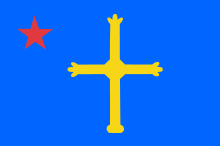 The nationalist banner used by Andecha Astur
The nationalist banner used by Andecha Astur
- (Nationalism: 1.25% URAS PAS, 0.65% Unidá, 0.46% Andecha Astur)
Nationalist parties (e.g., Andecha Astur) do not get much support from the population, but they clearly have an identity.
A wish for independence is stated sometimes by those parties, but as the independent and pre-Spanish Kingdom of Asturias was the initial core of the Reconquista, most of the people do not feel that there is any incompatibility in being Asturian and Spanish. Moreover, Asturian nationalist and regionalist claims are divided among independence, regionalism itself, conforming an autonomous community with Leon. Their sign of identity is the Asturian language.
The most important regionalist (not nationalist) party is Unión Renovadora Asturiana (Asturian Renewal Union, URAS), which split from the national centre-right People's Party in the 90s.
Canary Islands
Main articles: Canary Islands, Canarian people, and Canarian dialect- (23.27% CC)
Canarian nationalism has its roots in a number of events in the 19th century. Wars for independence in South America, self government during the Napoleonic invasions, and the crisis of 1898 were the catalyst for figures such as Nicolás Estévanez or Secundino Delgado. After a pause of several decades, a new nationalist movement has emerged there.
Its insularity requires several specific treatments. Over history the Canary Islands acquired special competences and privileges. In former times they even had the right to issue currency and their inhabitants were only obliged to perform military service milicias insulares within the Islands. The Islands were also governed by unique institutions called Cabildos insulares.
Franco's government continued this tradition and conceded several privileges to the islands to compensate for their remoteness.
Its Statute of Autonomy defines this region as a nationality.
The Canarian Government is drafting a new Statute of Autonomy where the Canary Islands will be defined as a nation. However this nationalism is mild in its formulation; thus independence is not even in the nationalist agenda. Historically, the Canarian Coalition can be deemed more as a lobby in order to favour Canarian interests within Spain rather than a nationalist movement like the ones formulated in other areas.
Regionalism
In most of these following regions people do not sense a conflict between Spanish nationality and their own claimed national or regional identity.
There are two main political streams in regionalism: Nationalism-Regionalism, which supports the definition of the region as a nationality or nation but usually within Spain, and "Regionalism", which originally supported the creation of an autonomous community for its region, and now acts only as a promoter of its region but within Spain and respecting the current status of autonomous community, and these "regionalist" parties are commonly associated with People's Party in its region (or acting as its substitute or branch, as in the Navarrese People's Union (UPN)), see Federation of Regionalist Parties and Regionalist Party of Cantabria (that currently rules Cantabria supported by the Spanish Socialist Workers' Party (PSOE)).
Castile
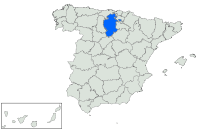 The province of Burgos, that is the ancient heartland of Castilla.
The province of Burgos, that is the ancient heartland of Castilla. Main articles: Castile and León, Castile-La Mancha, Madrid, Castilian people, and Castilian language
Main articles: Castile and León, Castile-La Mancha, Madrid, Castilian people, and Castilian language- (Nationalism-Regionalism: Castile-León 0.81% + Castile La Mancha 0.12% TC)
Regionalists and nationalists in Castile (such as Tierra Comunera) usually want to unify the traditional provinces mentioned in the Castilian Federal Pact signed by the Partido Republicano Federal in 1869, and that would include the modern communities of Castile and León, Cantabria, La Rioja, Castile-La Mancha and Madrid, and sometimes even some areas in the provinces of Valencia, Alicante and Murcia (since Tierra Comunera makes no mention of those once Castilian possessions in its ideological bases). The territory claimed by Castilian regionalists or nationalists contains both areas from the Kingdom of Castile (both Old Castile and New Castile) and areas from the Kingdom of León. Their claims are not usually based on the territory of the historical Crown of Castile, as it included the Basque or the Galician nations, they just hold a claim over the provinces that can be identified with Castilian identity according to them. They don't usually hold any claim over Andalusia, Extremadura, or Murcia.
In the map shown above it is visible that Castilla has the shape of a wedge from a bird's perspective, the way the Castilian language spread to other parts of the peninsula (from the province of Burgos).
See also: Castilian nationalismLeón
Main article: Leonese language- (Former Leonese Provinces 8,74%: León 12.74%, Zamora 1.76%, Salamanca 4.85% UPL+ZU+UPS)
Regionalists and nationalists from León fight for an independent autonomous community for the Leonese Country, the Spanish provinces of León, Zamora and Salamanca.
Nationalists from León claims too for the Unity, Selfgovernment and Officiality for the Leonese language in the Bragança District in Portugal and other irredent territories like Valdeorras in Galicia or other ones in the border with Castile.
Leonesism is the third political force in this territory after the autonomous electionships (2007), with more than 300 city councillors in the provinces of León, Zamora and Salamanca. Leonesist party UPL (Leonese People's Union), the biggest one, reached three seats in the Leonese City Council, where they govern with the PSOE; one deputy in the Diputación de León (provincial council) and two autonomical seats in the Castile and León's Parliament.See also: Leonese People's Union and País LlïonésEastern Andalusia
Main article: The region of Eastern AndalusiaThere is a regionalist movement in the eastern part of Andalusia (mainly Granada, Almería and Jaén, but with also some support in Málaga) which seeks to create an own autonomous community separated from western Andalusia. Historically, Granada was the last Arab kingdom inside the Iberian Peninsula, and had its own administrative region until 1933 when Blas Infante unified the Andalusian provinces. The Platform for Eastern Andalusia [5] has contributed to expand the movement. Among the reasons for the movement, the most important are economical, like benefiting from Spanish decentralization, as opposed to Sevilian centralism, but also historical. The movement is not associated to a particular political thought,[6] and there is not a particular political party aiming to create the new autonomous community.
Identity ambiguous regions in Spain
The following regions have belonged to different kingdoms, realms, states or regions for a time, and their population regularly consider themselves differently mostly depending on the part of the region.
Some of these want to be identified with their own regional identity (such as Navarre, Cantabria or Valencia), but in fact they are the outcome of different cultural and linguistical adjacent streams.For instance, people in the South of Navarra have never felt Basque, and if some of them are thinking that way nowadays, it is because of cultural-political influence or immigration from adjacent Basque areas. The same goes for the people in the Spanish monolingual areas in Valencia (who have never felt Catalan in any way), and people in eastern or southern parts of Cantabria (who will never feel they are related to Astur-Leonese people).
So, generally speaking, these regions are constantly trying to forge its unitary identity (through "regionalist parties"), but in fact they are composed of opposing identities with more or less well established inner frontiers. Although mutual influence on both sides of those imaginary borders is common and may eventually lead to a common identity, it is highly unlikely to happen in regions like Navarre (where the vast majority of its northern population does not even want to be Spanish, but they only represent actually a minority when taking into account the whole population of Navarre). In Valencia it seems that their opposition to both Catalan and Castilian influences has managed to create a unique, distinct (and controversial) identity.
- ("Regionalism": 42.2% UPN; Basque nationalism: 28.8% NaBai (Aralar, EA, PNV, Batzarre) + EAE "Ambiguous" moderated: CDN [7])
Its people may feel to be either Basque or Spanish, and their culture is more akin to either Aragon or La Rioja in the southern and eastern parts, but in the northern part lies the original homeland of the Basque people, where Basque language is still spoken and is better preserved than in western and southern parts of the autonomous community of the Basque Country.
As stated by the Basque Statute of Autonomy, if approved by the Navarrese Parliament and popular referendum by majority, Navarre can join the autonomous community of the Basque Country at any time when its government and population so desires; no further actions are required. Navarre is not an Autonomous Community de iure (although it is de facto) because a Statute of Autonomy was not made nor approved by popular referendum (as happened in each Autonomous Community). Instead, it is ruled by a document called "Amejoramiento del Fuero" (Improvement of the Fuero) and the region is considered a "Foral Community".
According to the Ley Foral del Vascuence ("Foral Law regarding Basque Language") of the Navarrese Parliament is divided in three linguistical areas (Basque speaking area, Bilingual area and Spanish speaking area). See map.
See also: Nafarroa Bai and Navarrese People's UnionValencia
Valencian is spoken in most of the territory of the Valencian Community, however the nationalist sentiment is not widespread and most of the population consider themselves as much Valencian as Spanish.
The nationalist sentiment is not significantly higher in any province (electoral results show that just about 8% of the votes in Castellon, the closest province to Catalonia, are nationalist, higher in the provinces of Valencia with 10.43% and Alicante with 9.06%, according to municipal elections held in May 2007).
Notwithstanding, their electoral stronghold yielding most favourable results is an area split in two provinces: the southernmost end of the Valencia province and the northernmost end of Alicante province. The fact that this area is split between two provinces reduces relative percentages in both provinces.
It is in the local elections that the nationalists obtain their best results; thus they hold several town councils and significant representation - mostly in the areas mentioned above. Conversely, it is in the general elections to the Spanish Parliament where they score worst (approximately 2% of the votes). In the regional elections to the Autonomous Parliament, the main nationalist party Valencian Nationalist Bloc (BNV) usually gets around 4% of the votes, not having yet achieved the 5% threshold which grants representation in the regional Parliament.
There are territories in the Valencian autonomous community which are solely Spanish-speaking areas, where Valencian either was never spoken (roughly the inner 1/3 of the territory) or was historically sparsely spoken and finally disappeared (the southernmost part of the autonomous community, around the city of Orihuela). These territories comprise approximately 25% of the whole autonomous community. Since Valencian nationalism is primarily built around the Valencian language, this political option is virtually non-existent in these areas.
In contrast to the Valencian Union, the BNV and its forebears favour cooperation and ties with the other Catalan speaking territories and greater autonomy - if not independence itself - from Spain.
Esquerra Valenciana is a party "of national, republican and transforming left of the Valencian Country; that fights for the political sovereignty and defends the free confederation of this territory with Catalonia and the Balearic Islands". It has not so far achieved electoral representation of any kind.
Its Statute of Autonomy defines this region as a nationality.
See also: Politics of Valencia, Valencian Left, and Valencian Nationalist BlocBalearic Islands
- ("Balearic" nationalism: 6.88% PSM - Entesa Nacionalista; Majorcan Regionalism: 7.45% Unió Mallorquina)
Catalan is the co-official language in the region. It is very used in rural zones and a little less in the capital and in places with a high density of tourists. Balearic Catalan has developed into various dialectal variants that take their names from the names of the islands ("mallorquí", "menorquí", "eivissenc" and "formenterenc"). Though there are more Catalan nationalistic sympathizers than in Valencia, Spanish nationalism is highly present on the islands and it is considered a traditionally right-winged territory.
Cantabria
Main article: Cantabrian language- (National-"Regionalism": 28.87% PRC, main governing party in coalition with the Spanish Socialist Workers' Party)
This region founded the Kingdom of Asturias and later formed part of the Kingdom of Castile. However Cantabria kept its old culture due to its geographic peculiarities and isolation from Castile, relating more naturally to the northern peoples of Asturias and Biscay. Note that the eastern coast (Castro Urdiales, Laredo) is a residential area for Basques of Biscay. Its Statute of Autonomy could not be enacted during the Republican government (1931–39) because of the Spanish Civil War. In its current Statute of Autonomy, Cantabria is named a 'Historic Community'.
See also: Cantabrian Nationalist Council and Cantabrian Regionalist PartyExtremadura
Main articles: Extremaduran people, Extremaduran language, and Fala language- ("Regionalism": 0.06% EU)
This region was conquered partly by the Kingdom of Castile, partly by the Kingdom of León and partly by the united Crown of Castile, but it was repopulated by many Leonese people as well as by people from other places[citation needed]. Historically, Extremadura grew to become what it is now when some Extremaduran towns united to buy the right to vote in the Cortes for 80.000 ducats.
The Spanish spoken in Extremadura is typically southern, but it also has its own distinctive features which are more prominent in the North-West area, where the local rural dialect is even considered a language of its own, the Extremaduran language; it has common points with the Astur-Leonese linguistic group.
There are a few border areas where varieties close to Portuguese are spoken, for example near Olivenza, town over which the Portuguese Republic holds a claim.
Regionalist movements also exist here.
La Mancha
 Actualization of the Mancheguian Flag, eliminating the Alfonso XIII Coat of arms.
Actualization of the Mancheguian Flag, eliminating the Alfonso XIII Coat of arms. Main article: Mancheguian regionalism
Main article: Mancheguian regionalism- (>0% PRM)
Mancheguian regionalism proposes that La Mancha is a region with its own identity, in the territories of the four provinces; Albacete, Ciudad Real, Cuenca, and Toledo. It has his its origins Mancheguismo that opposed the pan-Castilian thesis manifested foremost in Castilian nationalism.
Murcia
Main article: Murcian Spanish- (>0%)
This Mediterranean region belonged to the Taifa kingdoms of Al-Andalus, Aragon, and Castile; therefore, it shares many similarities with Andalusia, Valencia - due to relatively recent immigration a dialect of Valencian-Catalan is spoken among some of the 697 inhabitants (INE 2006) of Carche- and Castile-La Mancha.
There have been and there are some regionalist movements too. Their goal is to restore the traditional region of Murcia (including Albacete and maybe Almería, and to create the province of Cartagena).
The haven of Cartagena declared itself an independent canton in 1868.
Murcian and Manchegue identity are related by historical links.
Ceuta and Melilla
There are two identities in these African cities. The Spanish-speaking Christians feel similar to Andalusians, a minority of Christians (around 25% in Ceuta) also having Catalan roots, but Ceuta also has a bit of Portuguese essence and Melilla was in close contact with the French in the 19th century.
The bilingual Muslims speak Arabic and mainly Berber besides Spanish and have familiar, commercial and cultural relations with neighbour Morocco, although they generally maintain their political allegiance to Spain, despite the Moroccan claim on the two cities. This Berber language is used sometimes between the Spanish People of the city (Muslims, Christians, Jews, others), specially of Melilla like the Franco-Moroccan language. (lingua franca), many words are adapted by daily trade with Morocco and Algeria during the French colonial period from 1830 to 1962.
Sephardic minorities evidently feel more strongly Spanish and many have emigrated or changed their work home as business headquarters to other towns in Southern Spain, especially Málaga. Nevertheless, they too have strong cultural ties with Morocco. Also there is an Indostai (South Asian) minority from two centuries when the Spaniards, Portuguese and French had colonies in India and Africa.
 This map shows the regions in whose Statutes of Autonomy it is stated that they are nationalities.
This map shows the regions in whose Statutes of Autonomy it is stated that they are nationalities.
The rest of the autonomous communities (Asturias, Cantabria, Castile and León, La Rioja, Navarre, Madrid, Extremadura, Castile La Mancha, Murcia, and Balearic Islands) are defined as regions.
Aragon, Catalonia, the Balearic Islands and Valencia were part of the same state-kingdom under the Crown of Aragon before the Spanish unification.- The two terms do not have the same meaning, but are used indistinctively by nationalist parties when justifying their political plans within the Spanish Constitution (nationality is regarded as a euphemism of nation).
- The Spanish Socialist Workers' Party government under José Luis Rodríguez Zapatero has promoted the concept of Spain as a "Nation of nations"[8] to integrate nationalist claims within Spain, despite the ambiguous statement in the Spanish Constitution of 1978. It is non-constitutional for a region or nationality to declare itself a nation while inside the Spanish Nation[citation needed].
- Apparently, it is stated that an autonomous community of Spain can be either a nationality or a region, thus composing Spain of nationalities (Basque Country, Catalonia, Galicia, Andalusia, Aragon, Valencia, Balearic Islands and Canary Islands) and regions (the rest of Spain), but this is not explicitly specified anywhere in the constitution.
- The Spanish Constitution of 1978 makes Spain a decentralized state, which functions almost as a federation of states in fact.
- Even if an autonomous community declares itself a nationality (and it does have the constitutional right to do that) that does not actually mean anything radically different from a region, since the degree of autonomy is determined both by historical identity, i.e., whether they received a Statute of Autonomy during the Second Republic or not, and by the will of the people. In the 1980s, the statutes of the "historic nationalities" were approved in a "fast track" before those of the rest of the regions.
- The Spanish Government does not recognize the right of self-determination for the hypothetical underlying nationalities or nations and will not respect the outcome of an eventual regional referendum regarding the subject of self-determination or independence. However, the Basque Parliament voted for recognizing this right in its region.
- The term nationality refers only to the "autonomous community", and not to its citizens. That is, an autonomous community can be a nationality, but that does not imply that their citizens (also) have the nationality of that community, but only Spanish nationality. There is only a Spanish citizenship officially recognized.
- Nationalities and hypothetical nations in Spain are not always based on ethnic criteria (as in the case of Basque Country, Catalonia and Galicia) but on historical, linguistic and cultural facts which any person in those regions can assume and become identified with, regardless of his origin, family homeland or the fact that his ancestors belonged to different nationalities.
- Modern "peripheral" (opposed to "central" nationalism) nationalist movements in Spain (such as Basque nationalism, Catalan nationalism, Galician nationalism, Canarian nationalism, etc.) do not regard their "nations" as superior or better in any sense than any other one (although the founder of Basque nationalism thought so), just as distinct from the Spanish one.
This is further complicated by the fact that while in most countries nationalism at a local level equals separatism, in Spain, nationalists are not necessarily separatists (although admittedly many are). As an example, there are clearly defined nationalist parties that support separation from the Spanish state, like Esquerra. But, there are nationalist parties that purposefully do not state clearly their position on independence (as to maximize electoral success) and sway repeatedly between greater descentralization of the Spanish state and outright separation, like Convergence and Union, Basque Nationalist Party, and Galician Nationalist Bloc.
See also
Spanish peoples
Main article: Spanish people- Andalusian people
- Asturian people
- Aragonese people
- Basque people
- Canarian people
- Cantabrian people
- Castilian people
- Catalan people
- Extremaduran people
- Galician people
Languages of Spain
Main article: Languages of SpainOfficial languages
- Spanish (see also its dialects and varieties)
- Catalan/Balearic/Valencian
- Basque
- Galician
- Occitan (Aranese)
Recognised languages
Unofficial languages
Others
- Autonomous communities of Spain
- Provinces of Spain
- Historical regions of Spain
- Autonomist and secessionist movements in Spain
- The nationality debate in Spain
- Identities in Spain
- Coconstitutionalism
- Languages of Iberia
- Fueros
- Ethnic groups of Spain
References
- ^ Llibre dels feits del rei en Jacme, manuscrito Ms. 10121 de la B.N.E, folio 161
- ^ Calvo, José. La guerra de Sucesión. Madrid: Anaya, 1988. Breve análisis de una guerra que marcó la aparición de un nuevo Estado, más centralizado, que no olvida el marco internacional en que ésta tuvo lugar.
- ^ NACIONALISMO, FRANQUISMO Y NACIONALCATOLICISMO (EL ESTADO DE LA CUESTIÓN, 11) ISBN 9788497390682 Nº Edición:1ª Año de edición:2008 Plaza edición: MADRID
- ^ In the early 2000s the leftist nationalist-independentist ("abertzale") party of Batasuna was declared illegal by the Spanish judiciary system due to its failure to reject the terrorism of ETA, and thus could not be voted. In the 2009 elections, part of the abertzale world reorganized around two main lists, D3M and Askatasuna, but they were declared illegal on the same grounds. The election results granted about 535,000 valid votes to nationalist parties. If the 100,000 "void" votes are all taken as votes to the illegal lists, nationalist parties rank in about 55% support within the 1,150,000 cast votes. Source: Basque government election result archive
- ^ Platform for Eastern Andalusia in andaluciaoriental.es (spanish)
- ^ Ideas of the platform for Eastern Andalusia andaluciaoriental.es (spanish)
- ^ Adding 5.2% (spoilt votes) to 23.6% = 28.8%
- ^ "Montilla asegura que España es una 'nación de naciones' y la reforma constitucional debe recoger la 'singularidad'", Europa Press, August 8, 2004. However, compare José Bono Martínez: "más como nación de ciudadanos iguales en derechos y obligaciones que como nación de naciones o Estado de pueblos", Ministry of Defence, November 8, 2005.
Further reading
- Amersfoort, Hans Van & Jan Mansvelt Beck 2000 'Institutional Plurality, a way out of the Basque conflict?', Journal of Ethnic and Migration Studies, vol. 26. no. 3, pp. 449–467
- Conversi, Daniele 'Autonomous Communities and the ethnic settlement in Spain', in Yash Ghai (ed.) Autonomy and Ethnicity. Negotiating Competing Claims in Multi-Ethnic States. Cambridge: Cambridge University Press, 2000, pp. 122–144 [ISBN 0-521-78642-8 paperback]
- Flynn, M. K. 2004 'Between autonony and federalism: Spain', in Ulrich Schneckener and Stefan Wolf (eds) Managing and Settling Ethnic Conflicts. London: Hurst
- Heywood, Paul. The Government and Politics of Spain. New York St. Martin's Press, 1996 (see in particular ch. 2)
- Keating, Michael. 'The minority nations of Spain and European integration: A new framework for autonomy?', Journal of Spanish Cultural Studies, vol. 1, n. 1, March 2000, pp. 29–42
- Lecours, André 2001 'Regionalism, cultural diversity and the state in Spain', Journal of Multilingual and Multicultural Development, vo. 22, no. 3, pp. 210–226
- Magone, Jose' M. 2004 Contemporary Spanish Politics. London: Routledge, 1997
- Mar-Molinero, Clare. 'The Iberian peninsula: Conflicting linguistic nationalisms', in Barbour, Stephen and Cathie Carmichael (eds) Language and Nationalism in Europe. Oxford: Oxford University Press, 2000
- Moreno, Luis. 'Local and global: Mesogovernments and territorial identities'. Madrid: Instituto de Estudios Sociales Avanzados (CSIC), Documento de Trabajo 98-09, 1998. Paper presented at the Colloquium on ‘Identity and Territorial Autonomy in Plural Societies’, IPSA Research Committee on Politics and Ethnicity. University of Santiago (July 17–19, 1998), Santiago de Compostela, Spain [URL: http://www.csic.es/iesa/dt-9809.htm, 9 September 1998]
- Moreno, Luis. The Federalization of Spain. London; Portland, OR: Frank Cass, 2001
- Núñez Seixas, X.M.(1993): Historiographical approaches to nationalism in Spain, Saarbrücken, Breitenbach
- Núñez Seixas, X.M.(1999): "Autonomist regionalism within the Spanish state of the Autonomous Communities: an interpretation", in Nationalism & ethnic politics, vol. 5, no. 3-4, p. 121-141. Frank Cass, Ilford
- Paredes, Xoan M. 'The administrative and territorial structure of the Spanish State. Galicia within its framework', in Territorial management and planning in Galicia: From its origins to end of Fraga administration, 1950s - 2004. Unpublished thesis (2004, revised in 2007). Dept. of Geography, University College Cork, Ireland [URL: http://www.xoan.net/recursos/tese/GzinSp.pdf, 27 August 2008], pp. 47–73.
External links
- Asturies (Asturian)
- Ibarretxe Plan (Spanish - Multilingual)
- Statute of Autonomy of the Basque Country (1979) (Spanish)
- Statute of Autonomy of Catalonia (1979) (Spanish)
- Statute of Autonomy of Catalonia (2006) (Spanish)
- Statute of Autonomy of Galicia (1981) (Spanish)
- Draft of the new Statute of Autonomy of Galicia (Galician)
- Statute of Autonomy of Andalusia (1981) (Spanish)
- Draft of the new Statute of Autonomy of Andalusia
- Statute of Autonomy of Canarias (1982) (Spanish)
- Statute of Autonomy of Aragon (1982) (Spanish)
- Statute of Autonomy of Valencia (1982) (Spanish)
- Statute of Autonomy of Valencia (2006) (Spanish)
- Andalusia as a nation (Spanish)
- Tierra Comunera
- Detailed linguistic map of the Iberian Peninsula
Categories:- Nationalisms of Spain
- Subdivisions of Spain
- Regionalism (politics)
Wikimedia Foundation. 2010.


